| Description |
X-376 is a potent and dual ALK/MET inhibitor with IC50s of 0.61 nM and 0.69 nM, respectively.
|
| Related Catalog |
|
| Target |
ALK:0.61 nM (IC50)
MET:0.69 nM (IC50)
|
| In Vitro |
The ability of X-376 to inhibit the growth of different cancer cell lines harboring ALK fusions or point mutations is tested. X-376 is potent in H3122 lung cancer cells harboring EML4-ALK E13;A20 (IC50: 77 nM). X-376 is also potent in H2228 lung cancer cells harboring EML4-ALK E6a/b; A20 (IC50: 57 nM). Furthermore, X-376 is potent in SUDHL-1 lymphoma cells harboring NPM-ALK (IC50: 32 nM). X-376 also inhibits SY5Y neuroblastoma cells harboring ALK F1174L, MKN-45 gastric carcinoma cells harboring MET dependent, HepG2 cells and PC-9 lung cancer cell lines harboring EGFR exon 19 del with IC50s of 142 nM, 150 nM, 15.137 μM and 3.062 μM, respectively[1].
|
| In Vivo |
The effects of X-376 in vivo against H3122 xenografts are examined. A pharmacokinetic study reveals that X-376 shows substantial bioavailability and moderate half-lives in vivo. Nude mice harboring H3122 xenografts are treated with X-376 at 50 mg/kg bid. X-376 significantly delays the growth of tumors compared to vehicle alone. In the xenograft experiments, X-376 appears well-tolerated in vivo. Mouse weight is unaffected by X-376 treatment. Drug-treated mice appear healthy and do not display any signs of compound related toxicity. To further assess potential side effects of X-376, additional systemic toxicity and toxico-kinetic studies are performed in Sprague Dawley (SD) rats. Following 10 days of repeated oral administration of X-376 at 25, 50, 100 mg/kg in SD rats, all animals survive to study termination. The no significant toxicity (NST) levels are determined to be 50 mg/kg for X-376. At NST levels, X-376 achieves an AUC of 41 μM×hr and a Cmax of 5.04 μM[1].
|
| Cell Assay |
For viability experiments, cells are seeded in 96-well plates at 25%-33% confluency and exposed to drugs. The human lung adenocarcinoma cell lines H3122 and H2228 are treated with X-376 (10, 30, 100, 300 and 1000 nM). SUDHL-1 lymphoma cells are treated with X-376 (5, 10, 30, 100 and 300 nM). SY5Y neuroblastoma cells are treated with X-376 (30, 100, 300 and 1000 nM). At 72 hours post X-376 addition, Cell Titer Blue Reagent is added and fluorescence is measured on a Spectramax spectrophotometer. All experimental points are set up in hextuplicate replicates and are performed at least two independent times. IC50s are calculated using GraphPad Prism version 5 for Windows. The curves are fit using a nonlinear regression model with a log (inhibitor) vs. response formula[1].
|
| Animal Admin |
Mice[1] Nude mice (nu/nu) are injected with H3122 cells. Once tumors reach an average volume of 450 mm3, a total of 27 athymic mice harboring H3122 tumors are randomized and dosed via oral gavage with 50 mg/kg X-376 or the control vehicle. Two, five, and fifteen hours after the single treatment (3 tumors/timepoint/group), mice are sacrificed and serum is collected for assessment of drug concentration using an LC-MS based bioanalytical method.
|
| References |
[1]. Lovly CM, et al. Insights into ALK-driven cancers revealed through development of novel ALK tyrosine kinaseinhibitors. Cancer Res. 2011 Jul 15;71(14):4920-31.
|
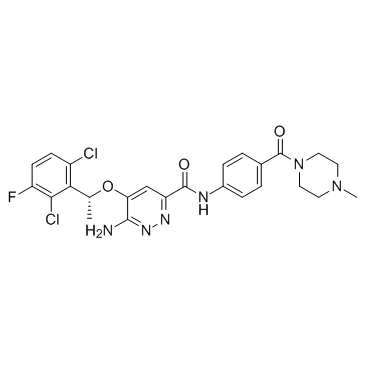
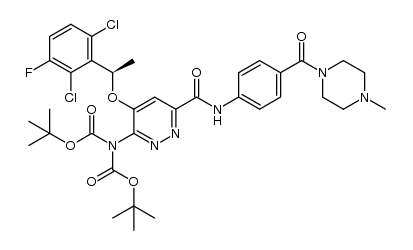 CAS#:1370651-39-0
CAS#:1370651-39-0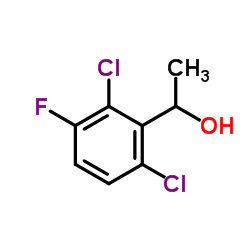 CAS#:756520-66-8
CAS#:756520-66-8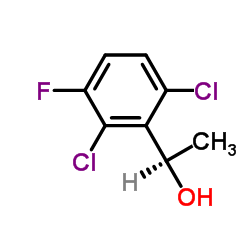 CAS#:330156-50-8
CAS#:330156-50-8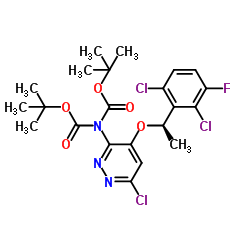 CAS#:1370651-32-3
CAS#:1370651-32-3![6-[Bis[(1,1-diMethylethoxy)carbonyl]aMino]-5-[(1r)-1- (2,6-dichloro-3-fluorophenyl)ethoxy]-3-pyridazinecarboxylic acid ethyl ester Structure](https://image.chemsrc.com/caspic/375/1370651-34-5.png) CAS#:1370651-34-5
CAS#:1370651-34-5![6-[bis(tert-butoxycarbonyl)amino]-5-[(1R)-1-(2,6-dichloro-3-fluorophenyl)ethoxy]pyridazine-3-carboxylic acid Structure](https://image.chemsrc.com/caspic/299/1370651-36-7.png) CAS#:1370651-36-7
CAS#:1370651-36-7